
Shopify Plus vs. Magento Commerce: An In-Depth Comparison
Shopify Plus vs. Magento Commerce (Adobe Commerce) are two of the most popular e-commerce platforms available for businesses in 2023. In this comparison guide, we will evaluate Shopify Plus and Magento Commerce. We’ll cover all crucial parameters, including features, pricing, performance, etc. It will help you decide which platform best fits your e-commerce business.
Key Takeaways
-
Understand the difference between Shopify Plus and Magento Commerce for your e-commerce.
-
Explore Shopify Plus’ fully hosted SaaS solution and compare it to Magento Commerce, which may require extra resources.
-
Discover the tailoring options offered by Shopify Plus. Compare this to Magento Commerce, which may require more technical knowledge.
-
Discover the integration features offered by Shopify Plus and Magento Commerce.
-
Compare the theme offered by Shopify Plus and Magento Commerce.
What is Magento Commerce?
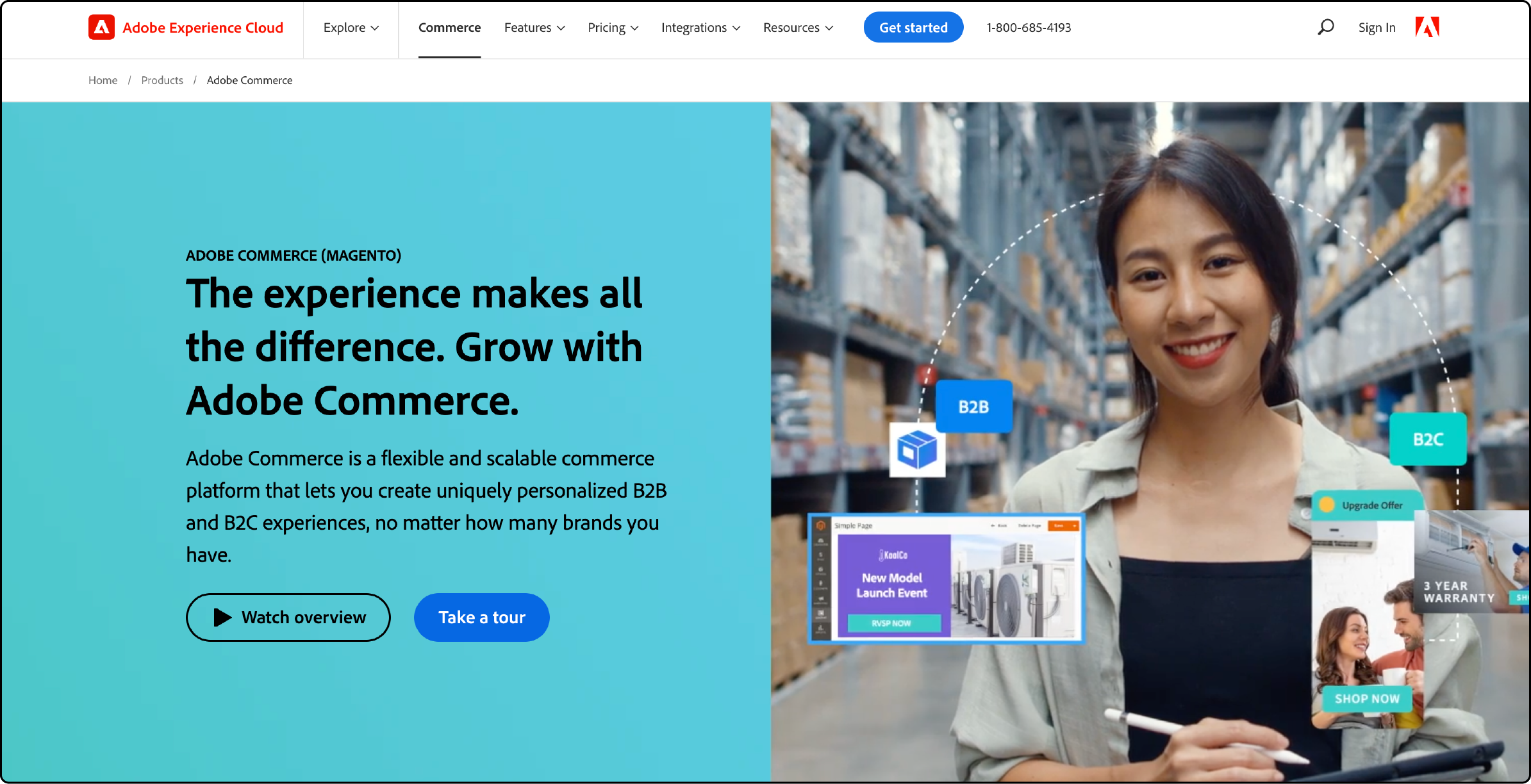
Magento Commerce (Adobe Commerce) is a popular ecommerce enterprise software. It offers advanced technologies to businesses, allowing them to cater to their specific ecommerce needs.
Adobe Commerce offers feature-rich omnichannel shopping with top-notch security, high performance, and scalability. It empowers businesses by:
- Simplifying website design with a user-friendly page builder.
- Streamlining inventory management.
- Unifying the shopping experience across channels.
- Facilitating global expansion.
Magento has many variations, including Magento Open Source, Magento Commerce Cloud, and Magento Commerce/Adobe Commerce. Businesses can choose between self-hosting or relying on Adobe Commerce Cloud services for hosting.
What is Shopify Plus?
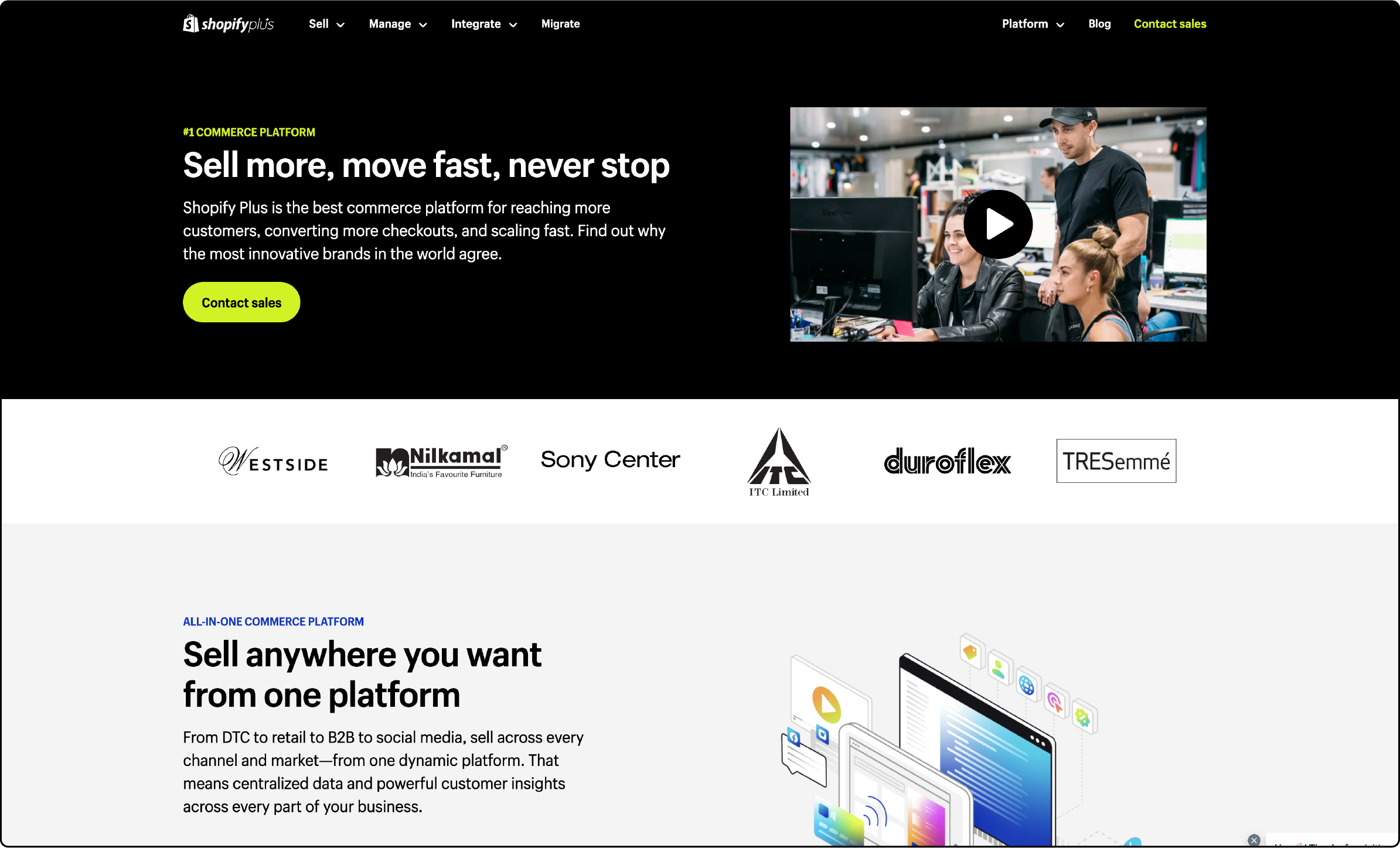
Shopify Plus is an enterprise-level edition of Shopify. It helps ecommerce businesses access more features than the standard model, integration options, and advanced support from Shopify Plus.
In contrast to Magento, Shopify Plus is not an open-sourced version. The hosting features of Shopify Plus make it an ideal choice for mid-sized and large enterprises.
Magento vs. Shopify Comparison
1. Pricing and Revenue Model
Shopify Plus
Shopify Plus follows a revenue-based model, including a monthly platform fee of $2,000. In addition to the base fee, it charges an extra 0.25% of monthly revenue, capped at $40,000. The pricing structure lets businesses scale their costs based solely on their monthly revenue.
Magento Commerce
Magento Commerce operates on an annual license fee structure. The annual fee for Magento Commerce starts at $22,000, with the final cost varying based on your business's revenue. This pricing model may suit companies with stable revenue streams or those expecting steady growth.
| Platform | Pricing Model | Platform Fee | Monthly Revenue Percentage | Annual License Fee |
|---|---|---|---|---|
| Shopify Plus | Revenue-based | $2,000 per month | 0.25% (up to $40,000) | N/A |
| Magento Commerce | Annual license fee | N/A | N/A | Starts at $22,000 |
2. Hosting Solution
Shopify Plus
Shopify Plus offers a fully hosted SaaS solution. It provides businesses with a platform to handle traffic and order volume changes. Merchants can focus on growing their business without worrying about additional hosting and management services.
Magento Commerce
Businesses may need additional hosting and management services to ensure optimal performance when using Magento Commerce. It can add complexity and extra costs to the overall operations. However, Magento Commerce offers more flexibility options, which may appeal to businesses with specific technical requirements.
| Shopify Plus | Magento Commerce | |
|---|---|---|
| Scaling | Offers a fully hosted SaaS solution | You can opt for Adobe Commerce Cloud edition for built-in cloud hosting. |
| High Traffic | Can handle fewer traffic spikes than Magento. | Can handle large traffic volumes and orders. |
| Best For | High-growth enterprise retailers with fewer development needs. | Large-Scale stores and product catalogs. Offers better multistore international capabilities. |
3.Customizing and Development
Shopify Plus
Shopify Plus offers a user-friendly environment with an intuitive coding language. It enables businesses to make changes according to their branding and design preferences easily. It also provides a vast library of themes and templates businesses can customize for a visually appealing storefront.
Magento Commerce
Magento Commerce is open-source and offers high customization. It offers a framework for businesses to build unique online stores tailored to their specific requirements. As an open-source platform, it allows modification of codes and the addition of attributes, but expertise in coding is necessary. You can also access a drag-and-drop feature for website content adjustment.
| Shopify Plus | Magento Commerce | |
|---|---|---|
| Ease of Customizing | Easy with user-friendly interface and intuitive coding language | High level of customisation. Requires technical knowledge and potentially hiring developers |
| Theme Library | Extensive collection of pre-built themes and templates | Magento offers thousands of custom themes made by community developers. The themes are categorized by industry/product size. |
4. Global and Omnichannel Capabilities
Shopify Plus
Shopify Plus allows merchants to expand their reach by selling on multiple channels and marketplaces. It empowers businesses to tap into the vast potential of social media platforms for increased visibility through its various integrations. The enterprise-level Shopify POS offers:
- Built-in Omni-channel selling
- Unified reporting
- Local pickup & delivery
- Fully synced customer profiles
Magento Commerce
Magento Commerce is a powerful enterprise-level eCommerce solution that offers extensive support and facilitates business growth. It facilitates the creation of new brands and product catalogues, including:
- Multi-tenant, multi-region storefronts
- Multi-channel connected experiences
Magento Commerce provides unlimited product variants, making it perfect for large-scale stores with numerous options like different colors, sizes, and styles.
Note: Ensure the number of records per product stays below 2,500.
Comparing Shopify Plus and Magento Commerce’s Global and Omnichannel Capabilities
| Platform | Global Capabilities | Omnichannel Capabilities |
|---|---|---|
| Shopify Plus | Allows merchants to sell on multi-stores and marketplaces | Offer seamless integration with social channels. |
| Magento Commerce | Allows retailers to manage multiple online stores from a single admin panel. | Allows retailers to reach customers across various: Social media platforms, Magento Marketplaces, Physical stores, Web stores, In-store Magento POS systems. |
5. Mobile Optimization
Shopify Plus
Shopify Plus stands out with its commitment to mobile-friendly design. It offers various responsive themes that automatically adjust to different screen sizes and devices. It means an effectively consistent and visually appealing experience for mobile shoppers.
With Shopify Plus, merchants can easily create a mobile-friendly online store without extensive coding or design knowledge. Brands can easily align their Shopify stores with its intuitive coding language and pre-built themes.
Magento Commerce
The Magento themes and templates ensure they work seamlessly across various mobile devices. It is a highly adaptable platform. It allows businesses to tailor their mobile experience to specific requirements.
You may develop a progressive storefront on top of your Magento website. With a progressive web app (PWA), your site will benefit from a native app. It can be installed on a user's home screen, offline mode, and fast website performance.
Shopify Plus vs. Magento Commerce: Comparison in Customer Experiences
Delivering exceptional customer experiences can significantly impact sales and brand loyalty. Both Shopify Plus and Magento Commerce offer a range of features and options to enhance customer interactions. Here are some key differences:
1. Performance
Shopify Plus
Shopify Plus ensures reliable website performance for its users, offering stable and consistent speed.
Magento Commerce
The speed of Magento 2 websites largely relies on hosting services. Opting for a reliable host with effective website optimization. It includes a well-configured server and optimized images, which can ensure excellent performance for your site.
2. Features Included and Third-Party Apps
Shopify Plus
Shopify Plus offers a comprehensive suite of features to provide merchants with everything they need when creating a successful online store. With built-in functionalities like inventory management and payment gateways, merchants can streamline their operations and provide a seamless shopping experience. It also offers an extensive library of over 6,000 apps in the Shopify App Store. Merchants can easily integrate additional functionalities as their business grows. It Includes:
- Selling in multiple currencies
- Single Dashboard to manage staff access, accounts, and entire organization
- Connect all third-party apps like Launchpad, Script Editor, and Shopify Flow
- Omni-channel selling
- Extend the Shopify Platform with REST and GraphQL APIs
Magento Commerce
Magento Commerce provides third-party extensions with unlimited product variants. It means merchants must carefully assess their needs and choose extensions aligning with their overall customer experience strategy. It has a well-established ecosystem of existing integrations, which includes:
- Multi-tenant, multi-region storefronts
- New brands and product catalogs
- Multi-channel connected experiences
- Unlimited product variants
Table: Comparison of Customer Experience Features
| Feature | Shopify Plus | Magento Commerce |
|---|---|---|
| User-Friendly Interface | Yes | Yes |
| Built-in Features | ✔ | ✔ |
| Extensive App Store | ✔ | ✔ |
| Customizing Complexity | Low due to limited customizations | High |
| Conversion Rate Optimization | ✔ | ✔ |
Shopify Plus Advantages
Shopify Plus has unique offerings and advantages. It can greatly contribute to the selection process for businesses seeking an e-commerce solution.
1. Pricing Plans for Every Business
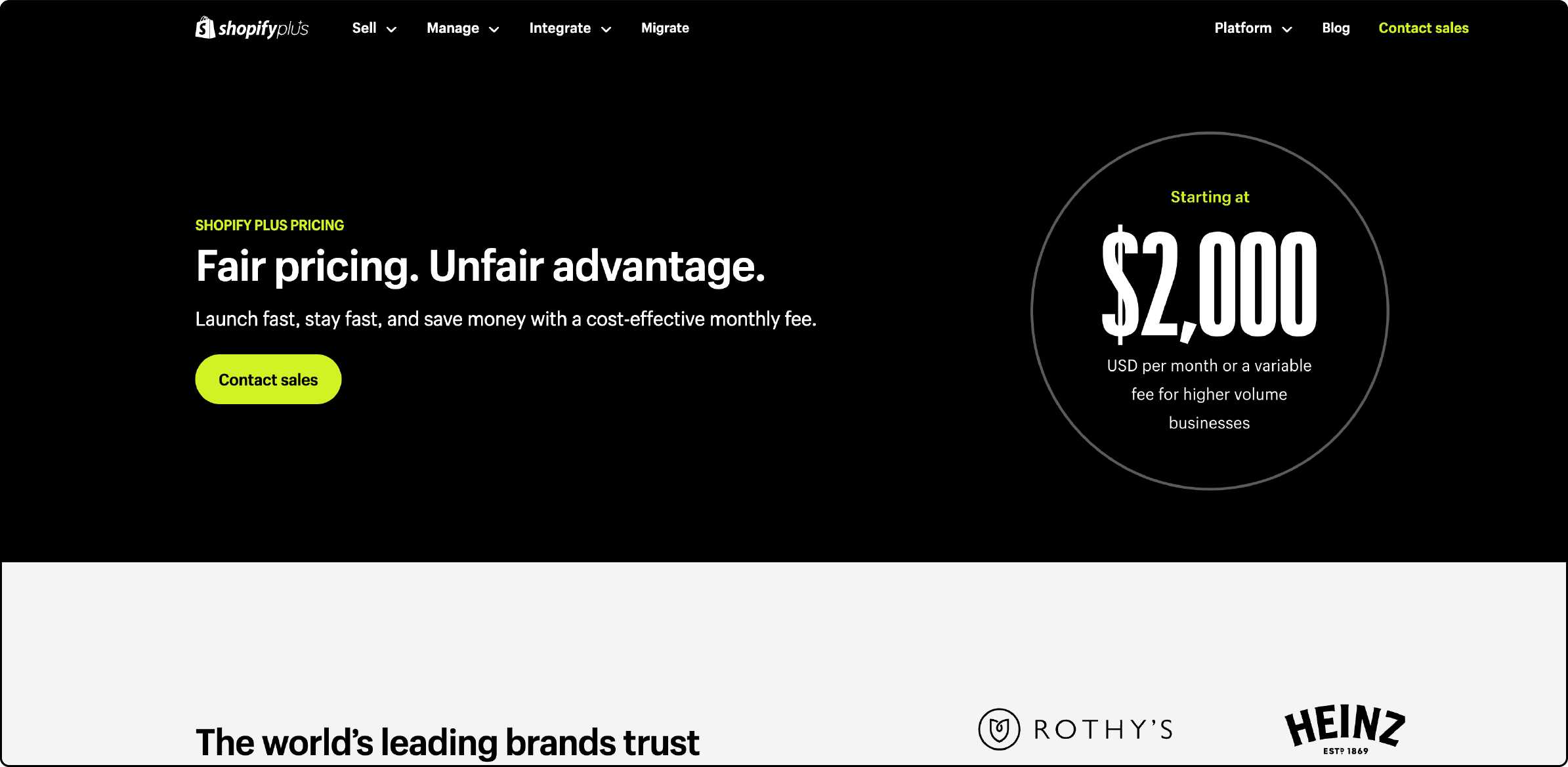
- Development Cost: It ranges between $0 to $250,000, depending on the level of advancement a business seeks.
- Credit Card Processing Fee: A small transaction fee of up to 1%. It’s applicable for third-party payment processing like PayPal, Skrill, and AMEX. It also offers its payment provider, Shopify Payments. However, businesses have to pay for it according to their chosen plan.
Table: Shopify Plus Pricing
| Pricing Component | Cost |
|---|---|
| Hosting | No separate fee once you migrate to Shopify Plus |
| Development Fee | Variable, depending on your requirements |
| Credit Card Fee | Shopify Payment and third-party payment providers are available. There’s a 1% payment processing fee deduction in the latter case. |
2. Built-in Themes
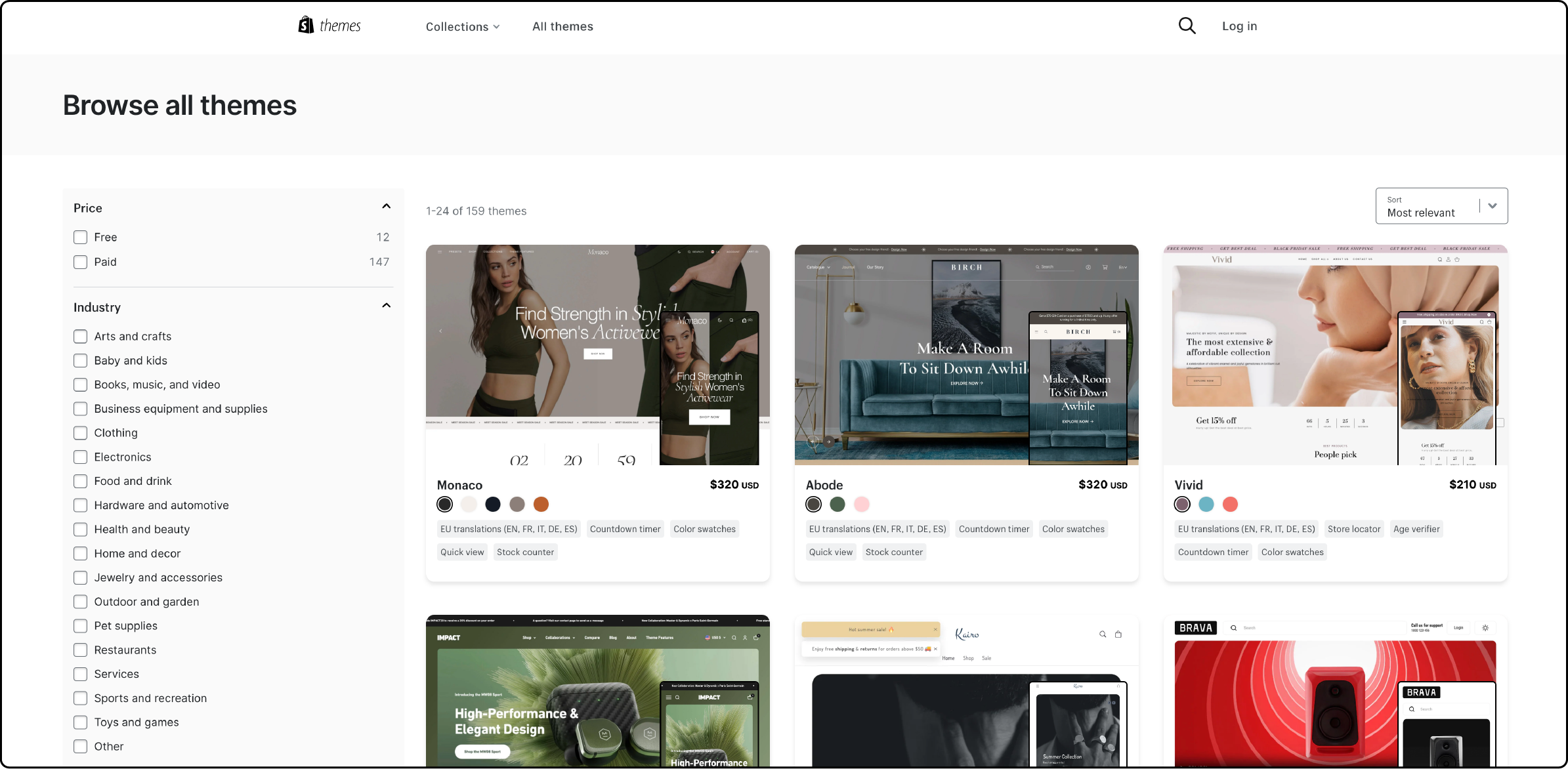
Another advantage of Shopify Plus is its extensive collection of themes available in the Shopify Theme Store. Businesses can choose any theme depending upon their brand alignment, be it something modern or a vintage aesthetic. It allows businesses to create a visually appealing and customised online store that aligns with their brand identity.
3. Third-Party Integrations
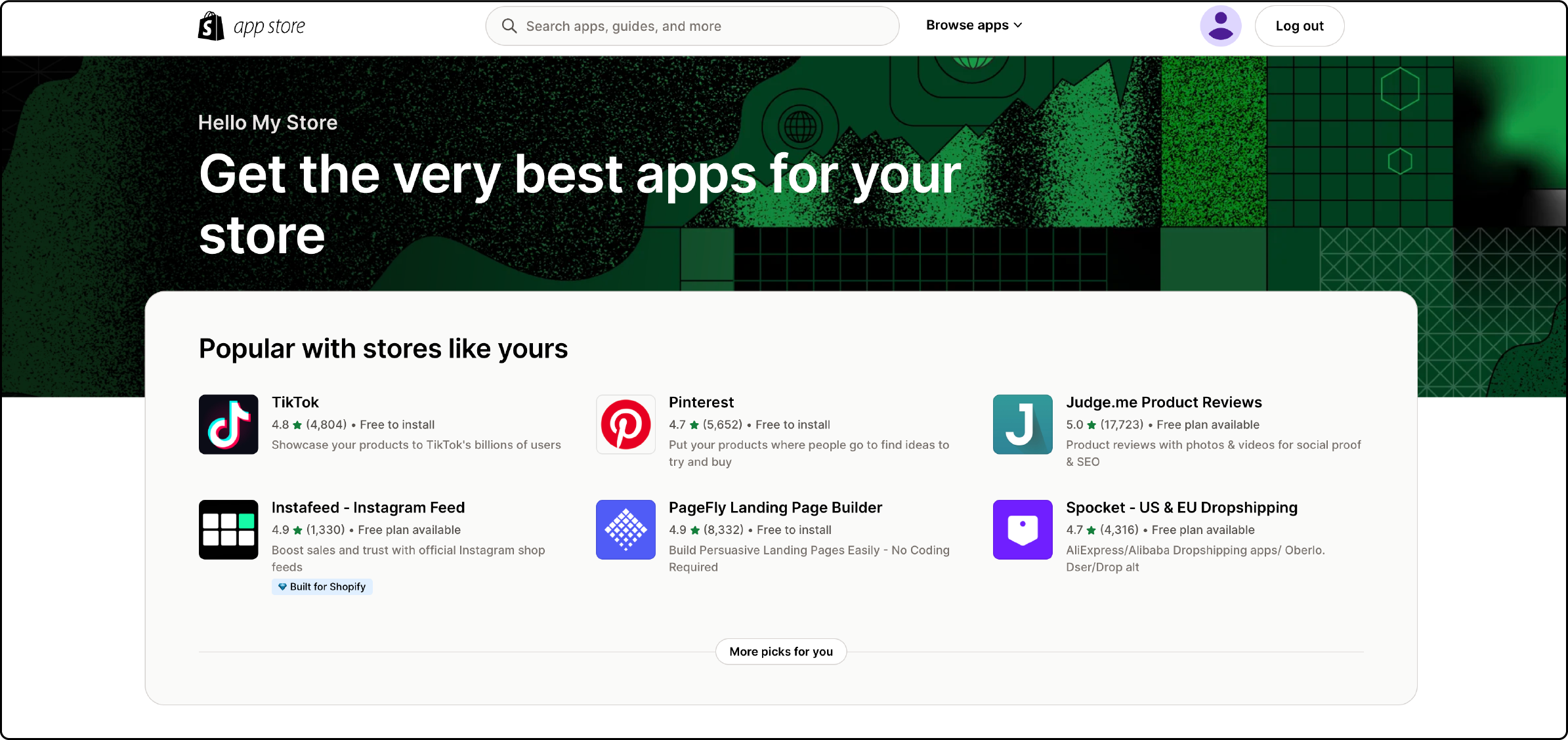
Shopify Plus offers access to the Shopify App Store, which provides a wealth of third-party integrations and extensions. From marketing tools to inventory management systems, businesses can enhance their e-commerce operations with ease. The Shopify App Store offers a selection of compatible apps, ensuring businesses can access reliable solutions.
Magento (Adobe Commerce) Advantages
Magento Commerce brings its offers and advantages, making a compelling case for businesses considering this platform. Here are some exceptional advantages Magento Commerce platform offers every ecommerce store:
1. Flexible Pricing
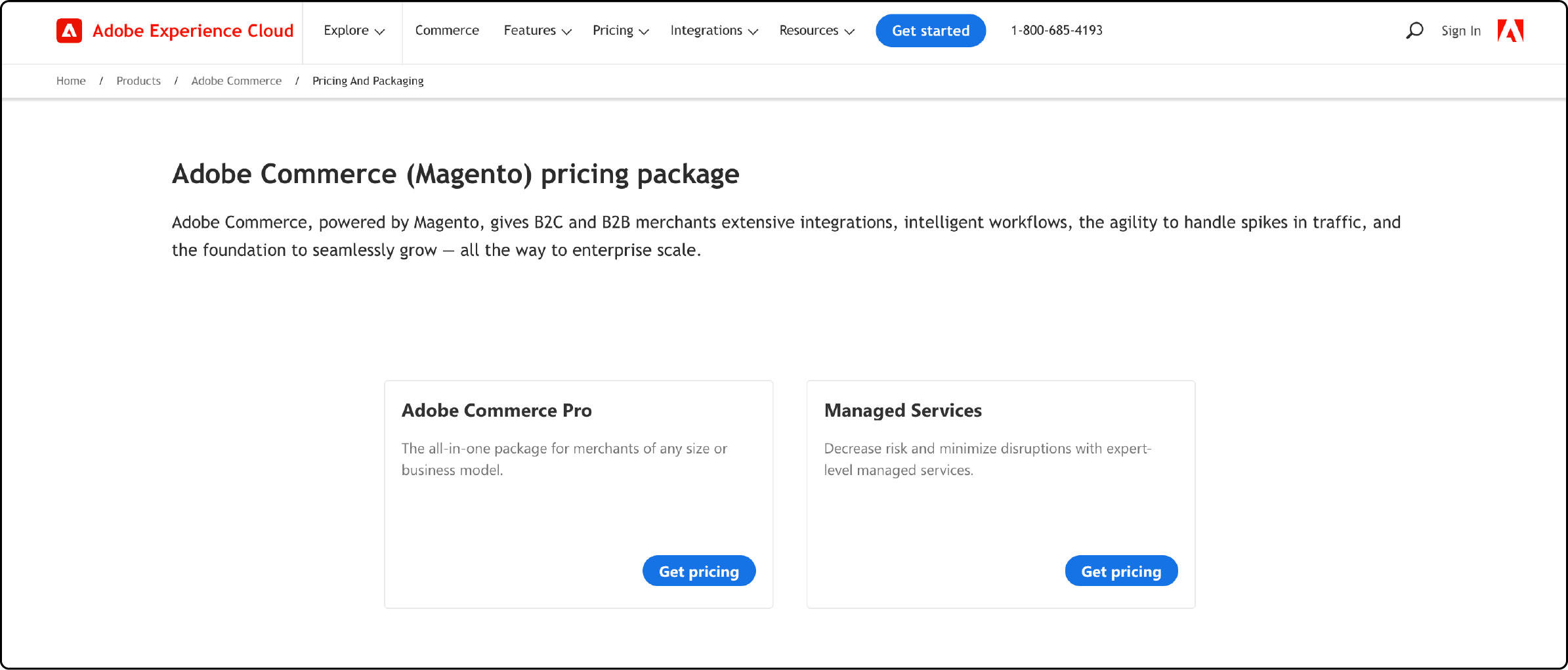
Magento offers a negotiable pricing plan catered for every business. You may need to submit your business details and information to Magento for a customised pricing plan. However, there are some reference charges you can consider from below:
-
Platform Fee: Starting at $20,000/year
-
Hosting: Businesses must buy separate hosting services from Magento 2 Commerce Cloud Hosting. It’s about $3,333/month for both hosting and platform fees. Third-party hosting providers are also available and may cost about $1,000/month.
-
Development Cost: This is more expensive than Shopify Plus and can range from $10,000 to $100,000.
2. Magento Marketplace Integration
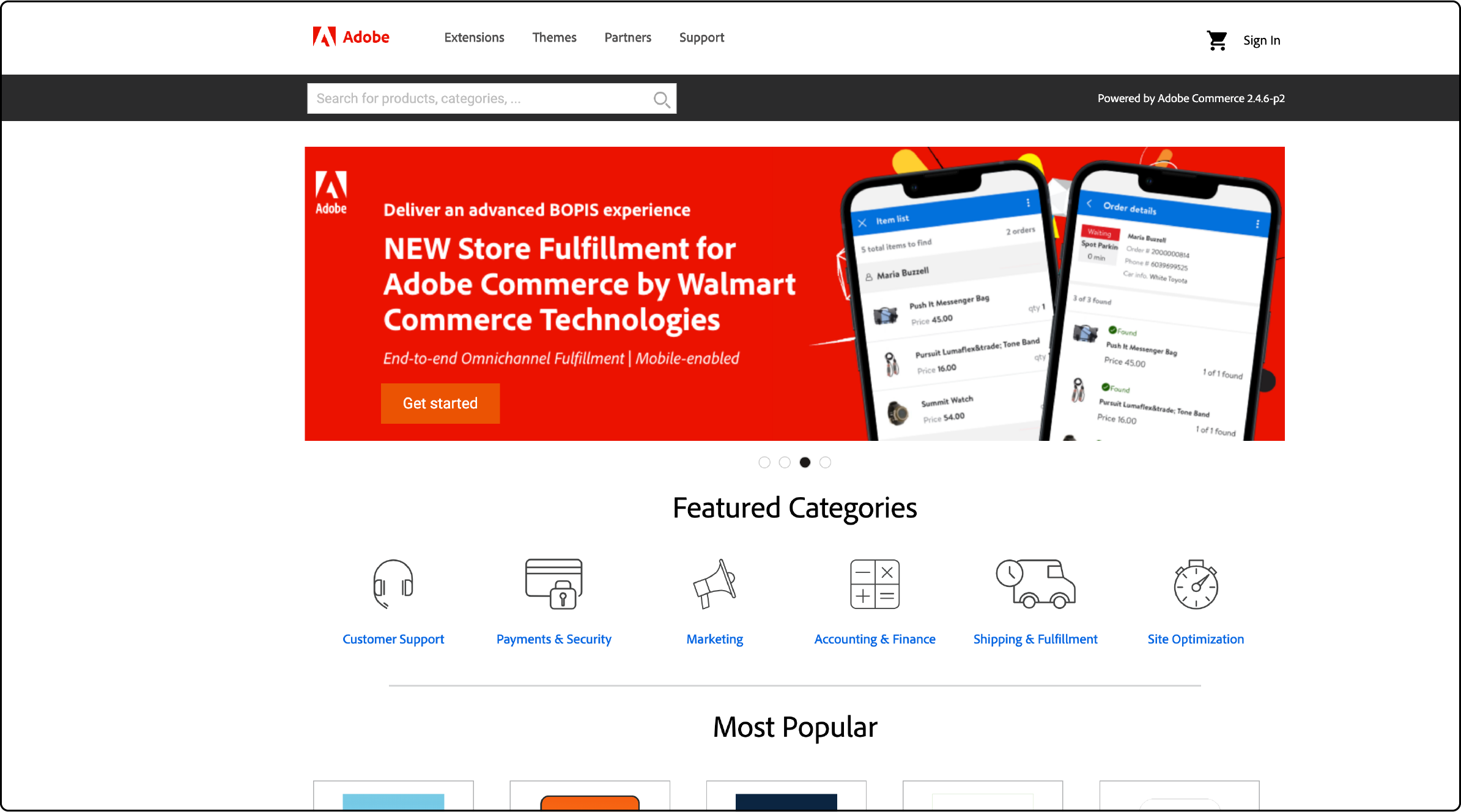
One of the key advantages of Magento Commerce is its integration with the Magento Marketplace. It offers a vast range of extensions and modules that can enhance the functionality of a Magento store. Businesses can easily integrate the necessary extensions to optimize their online stores, such as:
- Payment gateways
- Shipping integration
- Marketing tools
- Customer support solutions
3. Magento for Both Large and Small-sized Businesses
Another notable advantage of Magento Commerce is its ability to cater to small and enterprise-level merchants. With its different editions (open-source Magento and Magento Enterprise), businesses can choose a version that suits their needs. Since Magento Commerce is associated with Adobe Commerce, businesses can access an ecosystem of tools and resources. It will mean more growth opportunities.
| Magento Commerce Features | Advantages |
|---|---|
| Open-source nature | Flexible; more customizing options |
| Integration with Magento Marketplace | Access to a wide range of extensions |
| Multiple editions | Caters to both small and medium businesses and enterprise-level merchants |
| Association with Adobe Commerce | Access to a robust ecosystem of tools and resources |
Considerations for Migrating to Shopify Plus or Magento
When contemplating the transition to either Shopify Plus or Magento Commerce, businesses must conduct a thorough assessment to fully realize the benefits of these platforms. Several key factors ensure a smooth migration and harness the maximum advantages that each platform has to offer. These Key factors are:
1. Ease of Migration
When migrating to a new e-commerce platform, the ease of the migration process is a crucial consideration. Shopify Plus offers a straightforward migration process with built-in tools and resources to assist businesses in transferring their data.
Magento Migration offers greater scalability for custom feature development. The advantage of Magento platforms is that businesses can start with Magento Open Source and later migrate to Adobe Commerce or Adobe Commerce Cloud as they expand, paying for development services as needed. The open-source nature of Magento Commerce is a suitable option for businesses with more specific needs.
2. Support and Resources
Sufficient support and resources are vital during the migration process and ongoing operations. Shopify Plus offers 24/7 customer support, dedicated account managers, and a vast knowledge base. Magento operates as an open-source platform with a vast and thriving community that has grown over the years. It includes:
- Magento DevBlog
- Best Practices Guides
- Community Forums
- User Guides
- Resource Center
- Tutorials and Blogs
3. Security
Shopify Plus includes the following security features:
- Fraud analysis
- PCI Compliance
- GDPR Compliant
- SSL Certificates are available for every Shopify site
Magento Commerce includes the following security features:
- Security extensions
- Magento Security Scan
- PCI Compliant (Commerce edition)
- Regular updates
4. SEO
Shopify Plus has a basic set of SEO options where all configurations are made at the server level. You cannot easily modify URL structure and hierarchy, cache headers, or implement certain technical SEO components. You can only edit meta tags and optimize your inventory and product pages. Building a Shopify Plus store on a sub-directory is impossible.
Magento Commerce’s open-source system offers native advanced features to improve SEO performance on this platform. Additional features like no-follow links, redirect links, and canonical tags make it easier for search engines to index your website.
It also does not need to be on a local ccTLD (country code top-level domain) or a subdomain. You can easily build it on a sub-directory. With sub-directories, your site could get crawled more often as you constantly add new content.
5. Merchandising
Merchandising is “the activity of promoting the sale of goods”, and it plays a significant role in the success of an eCommerce business. On Shopify Plus, users can choose from base ordering options and manually reorder products in their collections. It also lets you set a base order, switch to manual, and re-order from there. However, Shopify Plus does not support multiple product types.
The options for base order are:
- Bestselling
- Product Name A-Z and Z-A
- Price high-low and low-high
- Newest and oldest
In Magento Commerce there are seven standard product types:
- Simple products
- Configurable products
- Bundled products
- Downloadable products
- Virtual products
- Grouped products
- Gift cards
It allows you to create rules to set up related products that you want to display. These rules reduce the manual work, especially for sellers with large categories
Table: Feature comparison table
| Feature | Shopify Plus | Magento Commerce |
|---|---|---|
| Drop-shipping | Built-in integration with Oberlo | Possible with extensions |
| Security | Fraud analysis, PCI Compliance, GDPR Compliant, SSL Certificates are available for every Shopify site | Security extensions, Magento Security Scan, PCI Compliant (Commerce edition), Regular updates |
| Currencies | 133 currencies | 200 currencies |
| Multilinguality | Possible with extensions | Built-in feature for multiple regions |
| Provisions for coupons | Built-in feature on every plan except Lite | Built-in feature with discounts |
FAQ
1. What is the pricing structure of Shopify Plus and Magento Commerce?
Shopify Plus offers a revenue-based model with a platform fee and a percentage of monthly revenue. Magento Commerce has an annual license fee based on revenue.
2. How scalable are Shopify Plus and Magento Commerce?
Shopify Plus is a fully hosted SaaS solution. It can handle high traffic and order loads, while Magento Commerce may require additional hosting and management services.
3. Which platform is easier to customize, Shopify Plus or Magento Commerce?
Shopify Plus is easier to customize, using an intuitive coding language and providing a library of themes. Magento Commerce requires more technical knowledge and often requires hiring developers.
4. Do Shopify Plus and Magento Commerce support selling on multiple channels?
Shopify Plus allows merchants to sell on multiple channels and marketplaces. Magento Commerce lacks integration with common social channels.
5. Are the themes of Shopify Plus and Magento Commerce optimized for mobile devices?
Shopify Plus offers an optimized interface for mobile devices with responsive themes. Magento Commerce requires more effort to achieve mobile optimization.
6. What specific advantages does Magento Commerce offer?
Magento Commerce offers features such as the Magento Marketplace, an open-source platform, and the association with Adobe Commerce.
Summary
Shopify Plus vs. Magento Commerce is a debate of much speculation. Businesses need to consider their goals, financial restraints, and features for their deal platform.
Both Shopify Plus and Magento Commerce offer exceptional services, but it all depends on what the business needs. Shopify Plus is more suitable for small to medium startups due to its low upfront and operational costs and maintenance requirements. Magento (Adobe Commerce) is suitable for large enterprises looking to build websites internationally due to its flexibility.
Want to select the best hosting for your Magento platform? Explore Magento hosting that ensure top-notch performance, security, and scaling options for your online store.







